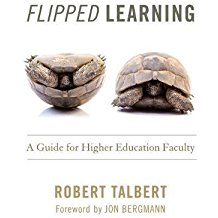Highlighted titles from the newest additions to the HSL Collection: You can find these books on the shelf, to the right, when entering the library. A full list of new titles can be found online.
Flipped learning: a guide for higher education faculty, by Robert Talbert.
“Flipped learning is an approach to the design and instruction of classes through which, with appropriate guidance, students gain their first exposure to new concepts and material prior to class, thus freeing up time during class for the activities where students typically need the most help, such as applications of the basic material and engaging in deeper discussions and creative work with it.” — Amazon |
LB1029 F55 T137f 2017 |
The brain that changes itself: stories of personal triumph from the frontiers of brain science, by Norman Doidge.
“An astonishing new science called neuroplasticity is overthrowing the centuries-old notion that the human brain is immutable, and proving that it is, in fact, possible to change your brain. Psychoanalyst, Norman Doidge, M.D., traveled the country to meet both the brilliant scientists championing neuroplasticity, its healing powers, and the people whose lives they’ve transformed—people whose mental limitations, brain damage or brain trauma were seen as unalterable. We see a woman born with half a brain that rewired itself to work as a whole, blind people who learn to see, learning disorders cured, IQs raised, aging brains rejuvenated, stroke patients learning to speak, children with cerebral palsy learning to move with more grace, depression and anxiety disorders successfully treated, and lifelong character traits changed.” — Amazon |
WL102 D657b 2007 |
Health care under the knife: moving beyond capitalism for our health, edited by Howard Waitzkin and the Working Group on Health beyond Capitalism.
“The book is comprised of individual essays addressing the “medical industrial complex,” the impact of privatization and cutbacks under neoliberalism, the nature of health-care work, and the intersections between health care and imperialism, both historically and at present. We see how the health of our bodies in “developed” countries is tied to the health of the bodies of the labor force in the Global South, and how the World Bank and the International Monetary Fund are linked strangely, inextricably, to our physical well-being. But this analysis would not be complete without the book’s final section, which delivers invaluable guidance for how to change this system. Recounting case studies and successful efforts for creating a more humane community, this book ultimately gives us hope that our health-care system can be rescued and made an integral part of a new and radically different society.” — Amazon. |
WA31 H4347 2018 |
Chasing men on fire: the story of the search for a pain gene, by Stephen G. Waxman.
“The story moves from genes to pain-signaling neurons that scream when they should be silent to people with a rare genetic disorder who feel they are on fire. Waxman explains that if pain-signaling neurons are injured by trauma or disease, they can become hyperactive and send pain signals to the brain even without external stimulus. Studying the hyperactive mutant pain gene in man on fire syndrome has pointed the way to molecules that produce pain more broadly within the general population, in the rest of us. Waxman’s account of the many steps that led to discovery of the pain gene tells the story behind the science, of how science happens.” — Amazon. |
WL704 W356c 2018 |
Doing a literature review: releasing the research imagination, by Chris Hart.
|
WZ345 H325d 2018 |





 “The ultimate guide to the “what,” “how,” and “why” of literature reviewing, the Second Edition of the classic text shows how the literature review will unlock the full potential of one′s research with:
“The ultimate guide to the “what,” “how,” and “why” of literature reviewing, the Second Edition of the classic text shows how the literature review will unlock the full potential of one′s research with: